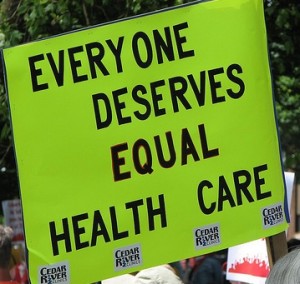Norman Daniels provides a different outlook on healthcare that questions the equality of health care and if it is distributed fairly.
One question that I asked myself while reading Daniels piece was whether certain social issues or conflicts (adventitious needs) warranted health care provision just as course of life needs are provided for. Should a nose augmentation be done if its purpose is not to enhance the ability to breathe, but to enhance self-esteem? Does not psychosocial or psychological issues warrant health care as well?
It is my opinion that certain procedures are more important than others and individuals who are in need of these procedures should receive the health care that is necessary to complete the procedure. If the disease or illness negatively affects normal opportunity range, then it is necessary to receive health care. I believe, however, that it is these differences and variances between individuals (effective opportunity) that constitute and allow that health care be just a little different amongst people. This does not mean that there should be a large variance in health care which will lead to unfair mistreatment and neglect of some patients over another, but it will make it so that all patients receive the healthcare that will most benefit their needs while giving all the opportunity to return to their normal opportunity range.
When comparing the lungs of a smoker and the lungs of an individual who is not a smoker, but has developed some type of lung disease, it is possible to see that these individuals are both in need of the same kind of health care. However, who should receive the better kind of care? Who should receive more attention? Who should be addressed first? Though many may say that the smoker placed these health issues on themselves and caused their disease or illness, it is only moral to provide healthcare to both these individuals. However, because no one is the same, the health care that is provided to both patients can vary in many ways. For example, the smoker may have been born with other health issues that make it more difficult to treat the lung problems the patient may suffer from. The other patient who developed the lung disease may also be an athlete and thus it is required that the kind of health care provided must also consider this health factor. Regardless of the extraneous issues that the patients may face, it is only moral and fair that these patients both receive health care that can allow the patients to return to their normal opportunity range.
Daniels also discusses there are some born with an advantage and a very lucky “natural lottery” (Daniels 465). Daniels indicates that health care addresses things that are not equally distributed; one person may never get sick, and another person must live their live on medication. I believe that this issue is one that undoubtedly must be cared for with health care, but the amount of health care that is provided depends on the severity of each case. Someone with constant allergies may need more care than someone who is allergic to animals. Alternatively, if someone is deathly allergic to cats, and another individual is allergic to multiple things but is not morbidly ill, the person with the possibly fatal allergy must be given more attention and health care in the case of a reaction.
Individual health care needs vary due to genes, location, family, and personal strengths, and many other factors. These factors do have a strong hand in deciding what kind of health care is most beneficial to a patient. I believe that it is moral to provide varying levels of health care if it means that all patients will be able to return to their normal opportunity range as Daniels describes.
Daniels, Norman. “Health-care needs and distributive justice.” Arguing About Bioethics. By Stephen Holland. London: Routledge, 2012. 457-471.



